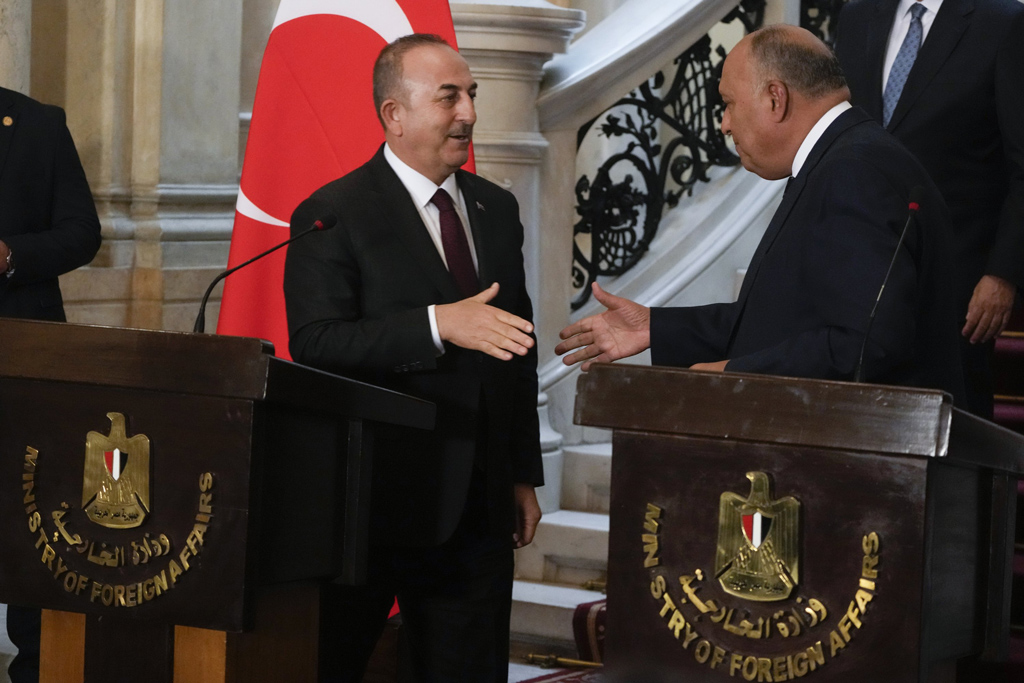Foreign Minister Mevlüt Çavuşoğlu paid
a landmark visit to Cairo over the weekend, marking the first time in 11 years that a Turkish foreign minister has visited Egypt.
The two countries’ relationship had deteriorated with the pro-status quo Arab countries after the Arab insurgencies and revolutions erupted in 2011. As a result, the Middle East states were divided into two camps: pro-change and pro-status quo coalitions. However, after the consolidation of the status quo in the region and new dynamics of the area, the regional states have begun to normalize their relations with the rest of the region.
The first normalization process began between the Arab states. Arab countries have normalized their relations with the once-otherized Qatar. Later, a normalization process was initiated between the Arab and non-Arab states of the region. Within this context, Türkiye has normalized its relations with the United Arab Emirates (UAE) and Saudi Arabia. However, initiating a similar process with Egypt has taken a long time.
As two significant regional powers, Türkiye and Egypt, they cannot ignore each other. Therefore, they have found a convenient time to hold exploratory talks in 2021. It was challenging to reach a reconciliation between the two conflicting states. However,
Middle Eastern normalization would remain incomplete without the normalization of Ankara-Cairo relations. The first step was taken by Türkiye when Treasury and Finance Minister Nureddin Nebati attended the annual meeting of the Islamic Development Bank in Cairo in June 2022. The positive atmosphere was reflected in trade relations. While the trade volume between Türkiye and Egypt was $1.3 billion in the first quarter of 2021, it increased by 85% in the first quarter of 2022 to $2.5 billion. Economic institutions have continued to arrange joint meetings to improve economic relations further.
The World Cup Opening Ceremony provided an opportunity for Qatar's Emir Sheikh Tamim bin Hamad Al Thani to bring President Recep Tayyip Erdoğan and Egyptian President Abdel-Fattah el-Sissi together. This was the first time they had a face-to-face meeting in 10 years, meeting in November 2022 in Doha. After the meeting, the two leaders underlined the deep historical ties and signaled an improvement in the normalization process. However, the conflictual perspectives of the two countries in regional crises have continued.
Diplomacy at work after quake
The devastating earthquakes in southeastern Türkiye on Feb. 6 provided
another opportunity for bilateral relations to develop. Like many states with hostile relations with Türkiye, Egypt
extended a helping hand to Türkiye after this great disaster. First, President el-Sissi called President Erdoğan, offered his condolences, and showed his country's solidarity. Second, Egypt sent different types of humanitarian aid to the earthquake area. Third, Egypt sent its foreign minister,
Sameh Shoukry, to Türkiye. The Egyptian minister visited quake-hit Adana and Mersin provinces on Feb. 27. This was the first foreign ministerial visit from Cairo to Türkiye in the last decade. During the visit together with his counterpart Mevlüt Çavuşoğlu, Shoukry observed the earthquake area. Furthermore, they discussed the future roadmap for normalizing bilateral relations.
Following the agreement between the two sides, the first ministerial visit from Türkiye to Egypt was held on March 18. Çavuşoğlu paid a historic visit to the capital Cairo. First, this is crucial to normalizing bilateral relations between the two regional powers. From now on, the two countries will try to pursue a win-win policy in the region. At least, they will be much more sensitive to the interests and concerns of each other. Soon, they will exchange ambassadors and establish the highest level of diplomatic relations.
Second, they will abandon their conflictual and zero-sum perspectives toward each other. In other words, they will reset their bilateral relations. As it is understood from the statements made by the ministers of the two sides, a new page will be opened between Türkiye and Egypt, and diplomatic relations will be maximized first. Then, cooperation opportunities in areas such as economy, trade, energy and tourism will be explored. Within this context, Çavuşoğlu emphasized that Turkish companies will be encouraged to invest in Egypt in various economic fields, especially in the trade, energy and transportation sectors, which is an expression of the rapid development of economic relations.
Libyan crisis
Moreover, the two countries’ authorities will consult with one another in regional crises. The two issues on which bilateral relations have been the tensest recently are the Libyan crisis and the developments in the Eastern Mediterranean. While the Egyptian side expects a policy change from Türkiye regarding the Libyan situation, the Turkish side expects Egypt to change its policy regarding the Eastern Mediterranean. With
the normalization of relations between Ankara and Cairo, there will be new developments in these two issues in line with the interests of the parties. In return for assuring Egypt regarding Libya, considering Egypt’s sensitivities and trying to find a joint solution, Ankara expects Cairo not to be involved in projects that would harm Türkiye’s interests in the Eastern Mediterranean.
Fourth, the normalization of relations between the most important country of the Arab world and Türkiye, one of the most influential actors in the region, is of great importance for the political stability and prosperity of the area. Since Middle Eastern countries know they cannot depend on global powers to protect their national interests, they are determined to develop regional initiatives and improve their relations with other regional actors. Therefore, not only Arab countries but also non-Arab countries will prioritize regional initiatives and normalize intra-regional relations. Furthermore, the implication of the Ankara-Cairo cooperation axis is more significant than any other regional axis. Therefore, it will attract other states to follow the same course of action and encourage Türkiye to establish constructive relations with other Arab countries without any reservations.
Considering the deep historical relations and cultural closeness between the sides, it can be easily inferred that it will not be difficult to repair the relations. Therefore, the two states will soon restore their relations and initiate cooperative processes. Furthermore, since changed regional conditions and the balance of power require a reshuffle of bilateral and multilateral relations, the regional states will act accordingly and pursue harmonious relations. Thus, with these last moves, the last circle of the Middle Eastern normalization process will be completed.
[Daily Sabah, March 22 2023]









